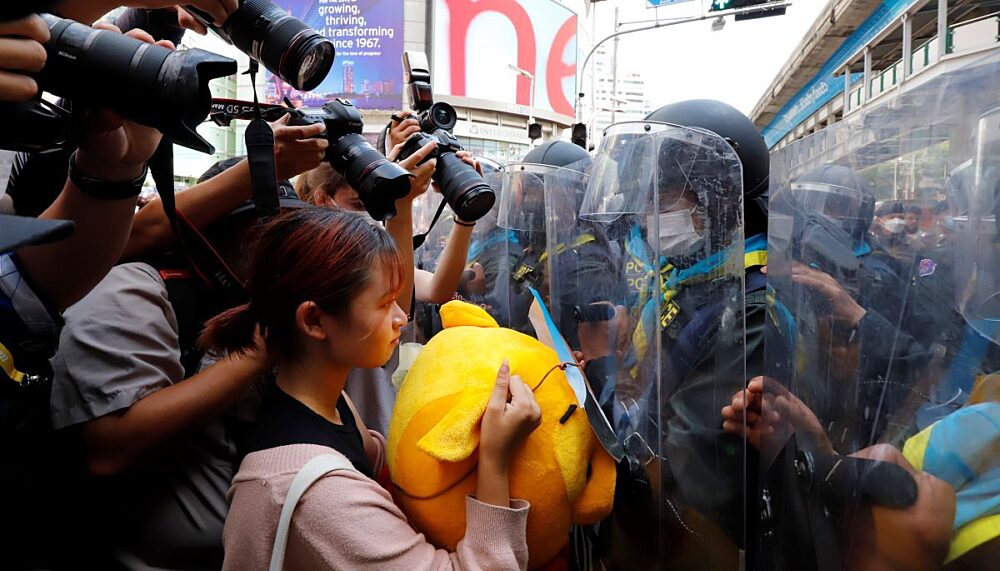PAST PROJECT
Support to women insider mediators in peaceful protest movements

We support female insider mediators in peaceful protest movements to enhance their conflict resolution capacities.
Timeframe: 2023 - 2025
Over the course of 21 months, the Berghof Foundation, in consultation with UN Women in an advisory and coordination capacity, supports women insider mediators actively involved in peaceful protest movements.
The primary aim is to enhance their inclusion and support them to make meaningful contributions to conflict resolution processes in regions affected by conflict.
Based on three case studies spanning different regions from Latin America, the MENA region and South East Asia, we want to learn more about the – oftentimes informal – roles women play as insider mediators within movements or between protest movements and other stakeholders. We also seek to gain a deeper understanding of the gender norms that shape these roles. Drawing from the identified practices and needs, we will engage with women from peaceful protest movements. Our goal is to increase their conflict resolution skills and capacities, allowing them to leverage their knowledge and expertise more effectively in peace processes and potentially take on more formal roles in conflict transformation processes, in line with the Women, Peace and Security (WPS) agenda.
Background
Over the last decade, the world has witnessed a surge in peaceful mass protest movements, resisting systemic violence, demanding constitutional and institutional change, and mobilising for peace. Peacebuilding scholars and practitioners have started to expand their understanding of mediation moving beyond formal processes aimed at resolving armed conflicts, to also include grassroot everyday practices to bridge gaps in state-society relations and facilitate socio-political change.
Previous research, based on case studies and experience, has shown that while formal mediation does not always take place in conflicts involving mass protest movements, more informal and situated mediation takes place between various actors. This mediation occurs between different factions of a movement, between the government and broader society, or between the government or security forces and armed groups.
While both women and men are involved in these movements, anecdotal evidence suggests that women often play prominent leadership roles but may also take on less visible bridge-building roles as insider mediators between, for example, different factions within their movement, with broader society, or the government, security forces and armed group. Interestingly, at times, traditional gender stereotypes have been exploited to favour women’s roles.
Approach
Through collaborating with a core group of women from active as well as past protest movements, we aim to acknowledge and increase their conflict resolution practices. Our goal is to strengthen their conflict resolution skills and capacities and to enhance opportunities for them to be part of inclusive conflict transformation, potentially enacting more formal roles on peace processes.
Our approach is informed by practice-oriented and gender-sensitive research and needs assessment. Our work aligns with the Women, Peace and Security (WPS) agenda, connecting existing conflict resolution practices in informal space within communities to more formal tracks and processes. The research findings will be disseminated in international and regional policy arenas, bringing together mediation and WPS policymakers and experts. By reaching out to international key stakeholders, we aim to set impulses to increase the recognition of informal mediation roles played by women from peaceful protest movement and their potential for peace process.
Partners & funding
The project is implemented in close consultation with UN Women in an advisory and coordination capacity, bringing in their vast expertise and networks related to women inclusion in peace processes.
Activities
The project includes the following activities:
- Needs assessment and practice-oriented research: We work with insider researchers in four different contexts to better understand what mediation or leadership roles women are playing within peaceful protest movements, the gendered dynamics that shape and inform those roles, their influence on women’s leverage and legitimacy, and needs for support the women see themselves.
- Peer network & training: Building on the identified needs and roles, we bring together women playing insider mediation roles from different contexts to build their knowledge and skills to shape, facilitate, and to meaningfully engage in conflict resolution processes. This will be done through a series of needs-based training and peer- learning activities, bringing in peers and experts on specific issues of relevance (planned in 2024).
Watch our event on the role of women as insider mediators in peaceful protest movements:
Updates from this work:
- Video: Women mediators in peaceful protest movements 26 Sept 2024
Publications from this project:
- Building bridges for non-violent change. Women as insider mediators within the pro-democracy movement in Venezuela
Isabella Picón Ball. 2024
- Building bridges for nonviolent change. Women as insider mediators during the October 2019 protests in Iraq
Ilham Makki Hammadi. 2024
- Building bridges for non-violent change. Women as insider mediators in Thailandʼs 2020–2022 pro-democracy movements
Bencharat Sae Chua, Duanghathai Buranajaroenkij. 2024
- Policy Brief 17: Building bridges for nonviolent change. Women insider mediators in peaceful protest movements
Véronique Dudouet, Johanna-Maria Hülzer. 2024
Related publications & resources:
- Mubashir, Mir & Vimalarajah, Luxshi (2016), “Tradition / Faith-Oriented Insider Mediators (TFIMs) as Crucial Actors in Conflict Transformation – Potential, Constraints, / Opportunities for Collaborative Support (Baseline Study)”.
- Mubashir, Mir & Vimalarajah, Luxshi (2016), “Tradition / Faith-Oriented Insider Mediators (TFIMs) as Crucial Actors in Conflict Transformation – Potential, Constraints, / Opportunities for Collaborative Support (Synopsis)”.
- Rodríguez Prieto, Sergio (2022). "Attentive, assertive, supportive. EU support to nonviolent movements".
- Dudouet, Véronique & Schädel, Andreas (2020): "Incremental inclusivity in peace processes: Key lessons learnt. Berghof Policy Brief 11".
- Dudouet, Véronique; Hülzer, Johanna-Maria; Sallach, Carlotta & Schädel, Andreas (2020): "Incremental inclusivity: A recipe for effective peace processes?".
Project lead
Christine Seifert
Project Manager
email hidden; JavaScript is required
Team members
Véronique Dudouet
Rachel Gasser
Antonia März
Line Winterhoff
Media contact
You can reach the press team at:
+49 (0) 177 7052758
email hidden; JavaScript is required


